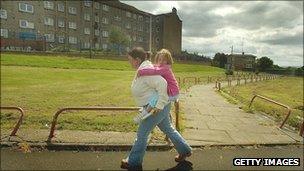Iain Duncan Smith: Child poverty approach 'set to fail'
- Published
- comments

Child poverty is predicted to rise by 100,000
Iain Duncan Smith has said tackling child poverty by boosting family income through benefits is a narrow approach which "looks set to have failed".
The work and pensions secretary said there were problems with officially classifying child poverty as a family on 60% or less than the median income.
It created perverse incentives to lift people just over the mark, he said.
Official figures published on Tuesday suggest child poverty is set to swell by 100,000 over the next few years.
The previous Labour government introduced a Child Poverty Act, creating a legally binding requirement for the government to end child poverty by 2020.
Official figures suggest 2.8m children are living in poverty.
'Inconceivable'
This week the Institute for Fiscal Studies said it remained "inconceivable" that the government would hit the 2020 target.
Mr Duncan Smith made his comments in a speech in central London, arguing that the way child poverty was measured and tackled had proved "hugely expensive" and looked likely to fail.
He said that while benefits would always play a "vital role" for some, such as people with serious disabilities, increased income did not always mean "increased wellbeing".
In some cases, families might be pushed further into welfare dependency, meaning their children were more likely to follow suit later in life.
"Income through benefits maintain people on a low income, whereas income gained through work can transform lives," he said.
He said measuring poverty through the 60% measure created a "poverty plus a pound" approach - where authorities did just enough to keep some families just above the 60% mark without really changing lives, while those at the very bottom could be left behind.
'Illogical'
Mr Duncan Smith said policies like the pupil premium - designed to help the poorest school children - had "the potential to completely alter a child's future" but did not count towards the measure because the financial impact could not be measured yet.
He suggested new measures of wellbeing - taking into account factors like health, education, life chances and family security - rather than an approach "narrowly focused on income alone".
He said: "We need to maintain our vital focus on poverty, while establishing much more effective ways of delivering on it and making a real change to families' life chances."
Official figures published in May showed the number of children living in poverty in the UK fell during Labour's last year in power by 2% to 2.6m.
On ITV's This Morning, Prime Minister David Cameron was asked about figures indicating that child poverty was set to increase by 100,000 over the coming years.
He said it was "illogical" that child poverty was recorded relative to average income - because the state pension was going up by an unusually high £5.30 a week, he said, it meant some households with children were less wealthy in relation to pensioners.
"I think there is a real problem with the way we measure child poverty," he said.
"It is the right thing to do to increase the pension. It doesn't make any child in this country poorer because you are giving pensioners more money at a time when they need it."
'Targets matter'
Later, the prime minister's spokesman said the government had no plans to change its official poverty measures .
But he said there was a "debate to be had" about whether "income transfer" or deeper causes of child poverty and social mobility should be examined.
However, one campaign group described the government's direction on the issue as "another nail in the coffin of the life chances of a generation of children".
"Relative poverty counts - without these targets the poorest families and children will fall further and further behind," said Rhian Beynon, head of policy and campaigns at Family Action.
"Moving the goal posts on income poverty might help the government balance the books but it will send the life chances of children into the red."
- Published11 October 2011
- Published12 May 2011
- Published5 April 2011